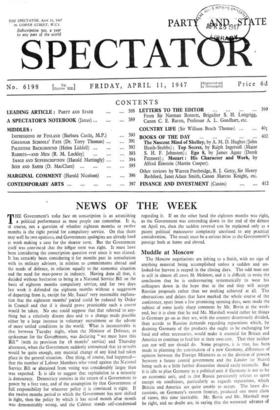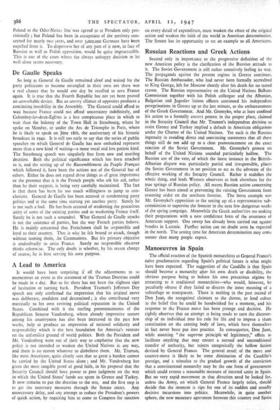Muddle at Moscow
The Moscow negotiations are jolting to a finish, with no sign of anything material being accomplished unless a sudden and un- looked-for harvest is reaped in the closing days. The odd man out is still in almost all cases M. Molotov, and it is difficult to resist the , conclusion that he is endeavouring systematically to wear his colleagues down in the hope that in the end they will accept Russian proposals rather than see nothing achieved at all. The obstructions and delays that have marked the whole course of the conference, apart from a few promising opening days, were made the subject of some justly sharp comment by Mr. Bevin at the week- end, but it is clear that he and 'Mr. Marshall would rather let things in Germany go on as they are, with the country disastrously divided, than accede to Russian demands regarding reparations which, by draining Germany of the products she ought to be exchanging for food and other necessaries, would make it essential for Britain and America to continue to feed her at their own cost. That they neither can nor will nor should do. Some progress, it is true, has been made in planning the constitution of a new Germany, differences of opinion between the Foreign Ministers as to the division of powers between a future central government and the Lander (or States) being such as a little further discussion should easily reconcile. But it is idle to plan Germany as a political unit if Germany is not to be an economic unit, and to that Russia persistently refuses to agree except on conditions, particularly as regards reparations, which Britain and America are quite unable to accept. The latest dis- cussions, on Germany's eastern frontier, produced one more clash of views, this time inevitable. Mr. Bevin and Mr. Marshall may be right, and no doubt are, in saying that the westward advance of
Poland to the Oder-Neisss line was agreed to at Potsdam only pro- visionally ; but Poland has been in occupation of the territory con- cerned for nearly two years, and over 5,000,000 Germans have been expelled from it. To dispossess her of any part of it now, in face of Russian as well as Polish opposition, would be quite impracticable. This is one of the cases where the always unhappy decision to let well alone seems necessary.



































